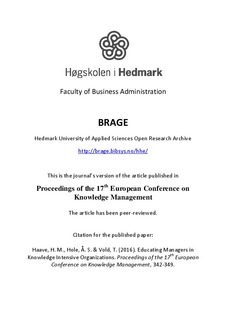Educating Managers in Knowledge Intensive Organizations
Journal article, Peer reviewed
Permanent lenke
http://hdl.handle.net/11250/2433077Utgivelsesdato
2016Metadata
Vis full innførselSamlinger
Sammendrag
Education boosts leaders’ confidence and competence level. A survey undertaken at Hedmark University of Applied Science shows that managers that enroll in studies in Organization and Management claim that studying has been a support in their development as managers, and has contributed to their confidence and competence level. In an increasingly more competitive marked, strategies on Knowledge Management (KM) seem more important than ever. By being able to assimilate, develop and share knowledge, organizations are able to stay competitive. The organizations thus need managers that accept, understand and can work with KM principles and strategies. KM is defined by Davenport(1994) as being about capturing, distributing and making sense and use of knowledge. In all the courses in the year program, there are elements from KM. However, it is not enough “knowing what”, this needs to be supported by “knowing how”, terms coined by Gilbert Ryle (1949). Supporting the process of going from declarative knowledge to procedural knowledge can be undertaken by e.g. features from Senge’s five disciplines(Senge, 1992), in particular team learning, systems thinking and shared visions. Underlying team learning, systems thinking and sharing visions, are reflection and how to utilize reflective methods. Student active methods embrace activities that facilitate reflection and reflective thinking, and experiencing. This paper presents how KM principles and strategies are supported in the education of leaders using the different student active methods. The data are mainly retrieved from a survey, and are supported by data from interviews and observations. The data from interviews are “member checked” to secure validity and credibility issues.

